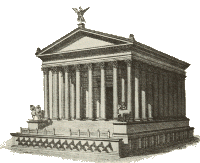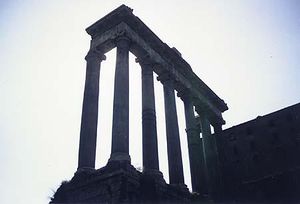HU:Cultus deorum Romanorum
| (7 intermediate revisions by 2 users not shown) | |||
| Line 1: | Line 1: | ||
{{languageBar|Cultus deorum Romanorum}}__NOTOC__ __NOEDITSECTION__ | {{languageBar|Cultus deorum Romanorum}}__NOTOC__ __NOEDITSECTION__ | ||
| − | [[Image:Platner-temple-line-trans-50.gif|right]]<onlyinclude>A ''Cultus Deorum Romanorum'' gyakorlata modern kísérletünk az ókori római vallás [[HU:reconstructionism|rekonstrukciójára]] a lehető legpontosabb megközelítésben. | + | [[Image:Platner-temple-line-trans-50.gif|right]]<onlyinclude>A ''Cultus Deorum Romanorum'' gyakorlata modern kísérletünk az ókori római vallás [[HU:reconstructionism|rekonstrukciójára]] a lehető legpontosabb megközelítésben. A ''Cultus Deorum Romanorum'' nem közelíthető meg csupán azzal, hogy a római istenneveket beillesztjük a görög vagy bármely más vallás rendszerébe, mert a római vallás éppolyan egyedi terméke a kultúrának, amely létrehozta, mint bármely más vallás. Állhatatosságot, elkötelezettséget, a halhatatlan istenekkel és az univerzum rendjével összhangban folyó munkát kíván meg tőlünk, és nem csak önmagunk miatt, hanem a világért is, amelyben élünk. Az isteneknek tetsző cselekedetekkel és hozzáállással mind az állam, mind az egyén áldásban részesülhet. Már maga a ''cultus deorum'' kifejezés is többet jelent, mint istenes cselekedeteket és evilági hatalmat; léteznek a római valláson belül misztikus hagyományok is, melyek belső, spirituális gyarapodásunkat célozzák még. </onlyinclude> |
==Hivatalos levelezőlista== | ==Hivatalos levelezőlista== | ||
| Line 7: | Line 7: | ||
A ''cultus deorum'' témakörébe tartozó kérdések megvitatására létrehozott hivatalos levelezőlistánk: http://groups.yahoo.com/group/ReligioRomana/ | A ''cultus deorum'' témakörébe tartozó kérdések megvitatására létrehozott hivatalos levelezőlistánk: http://groups.yahoo.com/group/ReligioRomana/ | ||
| − | + | <div style="width:100%"> | |
| − | + | <div style="width:49.7%;float:left; margin-left:0px"> | |
| − | + | ||
{{PortalBox | title=''Cultus Deorum in Roma Antiqua'' | content= | {{PortalBox | title=''Cultus Deorum in Roma Antiqua'' | content= | ||
| − | + | A latin '''''Cultus Deorum Romanorum''''' kifejezés Róma kereszténység előtti ősi vallására utal, mely a kezdetben még falusias kisváros agrárjellegű társadalmának hitvilágából fejlődött ki. | |
| − | <blockquote>" | + | <blockquote>"Őszintén hiszem, hogy Romulus a madárjóslatok révén, [[Numa tradition|Numa]] pedig a szent cselekmények elrendezésével vetette meg Városunk alapjait, amely az istenek tökéletes kiengesztelése nélkül sohasem lett volna ilyen hatalmas." -- [[Marcus Tullius Cicero|Cicero]] "Az istenek természete" (Havas László fordítása) </blockquote> |
| − | + | A szomszédos etruszk (és később a görög) civilizáció hatásától is befolyásolva a rómaiak kifejlesztettek egy sajátos, semmihez sem hasonlítható, komplex államvallást, melynek középpontjába a [[pietas|vallásos kötelesség-teljesítés]] került, ahol a legfőbb kötelességet az istenek kiengesztelése jelentette, szigorú előírásokat követő [[:Category:Ritus|szertartások]] által. }} | |
{{PortalBox | title=Válogatott linkek (Roma Antiqua) | content= | {{PortalBox | title=Válogatott linkek (Roma Antiqua) | content= | ||
| − | * [[Numa tradition]] | + | * [[Numa tradition|A Numa-hagyomány]] |
* [[Lararium]] | * [[Lararium]] | ||
| − | * [[Household worship]] | + | * [[Household worship|Házi imádság]] |
| − | * [[Reading list for the cultus deorum]] | + | * [[Reading list for the cultus deorum|Szakirodalom a cultus deorum témaköréhez]] |
| − | *''' | + | *'''Összes szócikkünk [[:Category:Roman religion|a római vallásról]].}} |
| − | {{PortalBox | title=Választott kép | content=[[Image:Temple of Saturn courtesy of Vroma.jpg|300px|center]]<br/> | + | {{PortalBox | title=Választott kép | content=[[Image:Temple of Saturn courtesy of Vroma.jpg|300px|center]]<br/>Saturnus temploma a [[Forum]]on.}} |
| − | + | </div> | |
| + | |||
| + | <div style="width:49.7%;float:right; margin-right:0px"> | ||
| + | {{PortalBox | title=''Cultus Deorum in Nova Roma'' | content= | ||
Sometimes called "Roman Paganism", the modern practice of the '''''Cultus Deorum Romanorum''''' is an attempt to [[reconstructionism|reconstruct]] the ancient religion of the Romans as closely as possible, making as few concessions to modern sensibilities as possible. As with other forms of historical reconstructionist paganism, every attempt is made to rely on actual historical and archaeological evidence, and interpolations are made only when the primary sources are silent, and then we strive to be consistent with them. [http://en.wikipedia.org/wiki/Polytheistic_reconstructionism] When gaps in the evidence, or the realities of modern life, make it necessary to create something new it should be: | Sometimes called "Roman Paganism", the modern practice of the '''''Cultus Deorum Romanorum''''' is an attempt to [[reconstructionism|reconstruct]] the ancient religion of the Romans as closely as possible, making as few concessions to modern sensibilities as possible. As with other forms of historical reconstructionist paganism, every attempt is made to rely on actual historical and archaeological evidence, and interpolations are made only when the primary sources are silent, and then we strive to be consistent with them. [http://en.wikipedia.org/wiki/Polytheistic_reconstructionism] When gaps in the evidence, or the realities of modern life, make it necessary to create something new it should be: | ||
*as consistent as possible with what we do know about the classical-era Romans and their legacy. | *as consistent as possible with what we do know about the classical-era Romans and their legacy. | ||
*clearly presented as a recent innovation. We frown on attempts to advertise something modern and invented as ancient and historical in order to give it an authority (and marketability!) it does not deserve. | *clearly presented as a recent innovation. We frown on attempts to advertise something modern and invented as ancient and historical in order to give it an authority (and marketability!) it does not deserve. | ||
| − | == | + | ==Kezdőlépések a ''Cultus Deorum'' követőinek== |
Because of the principles of reconstructionism, almost everything that can be said about the historical cultus is also true about the modern cultus. The articles on the ''cultus deorum in Roma antiqua'' and our "[[Reading list for the cultus deorum]]" are a good places to start.}} | Because of the principles of reconstructionism, almost everything that can be said about the historical cultus is also true about the modern cultus. The articles on the ''cultus deorum in Roma antiqua'' and our "[[Reading list for the cultus deorum]]" are a good places to start.}} | ||
{{PortalBox | title=Válogatott linkek (Nova Roma) | content= | {{PortalBox | title=Válogatott linkek (Nova Roma) | content= | ||
| − | * [[Declaration of Roman Paganism| | + | * [[Declaration of Roman Paganism|A római politeizmus deklarációja]] |
| − | * [[:Category:Nova Roma | + | * [[:Category:Virtual temples of Nova Roma|Nova Római Virtuális Templomok]] |
| − | * [[Priests (Nova Roma)| | + | * [[Priests (Nova Roma)|Papok és papságok]] |
| − | * [[:Category:Ritus| | + | * [[:Category:Ritus|Rítusok és rituálék]] |
| − | * [[Roman Calendar]] | + | * [[Roman Calendar|Római kalendárium]] |
| − | *''' | + | *'''Összes szócikkünk [[:Category:Religio Romana (Nova Roma)|a római vallásról Nova Romában]].''' |
}} | }} | ||
{{PortalBox | title=Nova Roma Kalendáriuma| content=Our [[Fasti_MMDCCLXI|calendar]] lists all of our official festivals. A printed version is available in the [[Macellum]]. | {{PortalBox | title=Nova Roma Kalendáriuma| content=Our [[Fasti_MMDCCLXI|calendar]] lists all of our official festivals. A printed version is available in the [[Macellum]]. | ||
| Line 47: | Line 49: | ||
The [[Nundinae|nundinal letter]] this year is '''{{marketday}}'''.}} | The [[Nundinae|nundinal letter]] this year is '''{{marketday}}'''.}} | ||
| − | + | {{PortalBox | title=''Cultus Deorum'' projects | content= | |
| − | + | ||
==Magna Mater Project== | ==Magna Mater Project== | ||
| Line 56: | Line 57: | ||
Citizens are invited to add photos to the [[Lararium|lararium page]].}} | Citizens are invited to add photos to the [[Lararium|lararium page]].}} | ||
| − | + | </div></div> | |
| − | [[Category | + | [[Category:Nova Roma (Magyar)]][[Category:HU:Portals]] |
Latest revision as of 16:17, 31 January 2013
Home| Latíné | Deutsch | Español | Français | Italiano | Magyar | Português | Română | Русский | English
A Cultus Deorum Romanorum gyakorlata modern kísérletünk az ókori római vallás rekonstrukciójára a lehető legpontosabb megközelítésben. A Cultus Deorum Romanorum nem közelíthető meg csupán azzal, hogy a római istenneveket beillesztjük a görög vagy bármely más vallás rendszerébe, mert a római vallás éppolyan egyedi terméke a kultúrának, amely létrehozta, mint bármely más vallás. Állhatatosságot, elkötelezettséget, a halhatatlan istenekkel és az univerzum rendjével összhangban folyó munkát kíván meg tőlünk, és nem csak önmagunk miatt, hanem a világért is, amelyben élünk. Az isteneknek tetsző cselekedetekkel és hozzáállással mind az állam, mind az egyén áldásban részesülhet. Már maga a cultus deorum kifejezés is többet jelent, mint istenes cselekedeteket és evilági hatalmat; léteznek a római valláson belül misztikus hagyományok is, melyek belső, spirituális gyarapodásunkat célozzák még.Hivatalos levelezőlista
A cultus deorum témakörébe tartozó kérdések megvitatására létrehozott hivatalos levelezőlistánk: http://groups.yahoo.com/group/ReligioRomana/
A latin Cultus Deorum Romanorum kifejezés Róma kereszténység előtti ősi vallására utal, mely a kezdetben még falusias kisváros agrárjellegű társadalmának hitvilágából fejlődött ki.
"Őszintén hiszem, hogy Romulus a madárjóslatok révén, Numa pedig a szent cselekmények elrendezésével vetette meg Városunk alapjait, amely az istenek tökéletes kiengesztelése nélkül sohasem lett volna ilyen hatalmas." -- Cicero "Az istenek természete" (Havas László fordítása)A szomszédos etruszk (és később a görög) civilizáció hatásától is befolyásolva a rómaiak kifejlesztettek egy sajátos, semmihez sem hasonlítható, komplex államvallást, melynek középpontjába a vallásos kötelesség-teljesítés került, ahol a legfőbb kötelességet az istenek kiengesztelése jelentette, szigorú előírásokat követő szertartások által.
Sometimes called "Roman Paganism", the modern practice of the Cultus Deorum Romanorum is an attempt to reconstruct the ancient religion of the Romans as closely as possible, making as few concessions to modern sensibilities as possible. As with other forms of historical reconstructionist paganism, every attempt is made to rely on actual historical and archaeological evidence, and interpolations are made only when the primary sources are silent, and then we strive to be consistent with them. [1] When gaps in the evidence, or the realities of modern life, make it necessary to create something new it should be:
- as consistent as possible with what we do know about the classical-era Romans and their legacy.
- clearly presented as a recent innovation. We frown on attempts to advertise something modern and invented as ancient and historical in order to give it an authority (and marketability!) it does not deserve.
Kezdőlépések a Cultus Deorum követőinek
Because of the principles of reconstructionism, almost everything that can be said about the historical cultus is also true about the modern cultus. The articles on the cultus deorum in Roma antiqua and our "Reading list for the cultus deorum" are a good places to start.Our calendar lists all of our official festivals. A printed version is available in the Macellum.
The nundinal letter this year is G.Magna Mater Project
The ultimate goal is the restoration of the Palatine temple of Magna Mater. There is a full description of the project.

